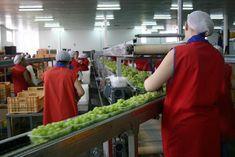
In the major UK supermarkets, loose grapes are still largely dominating the scene.
Sainsbury’s, for instance, will continue to retail grapes in bags for the foreseeable future, according to exotic fruit buyer, Christian Hickey. “We sell the largest volume of our grapes loose in bags, which obviously give customers greater flexibility,” he says. “The specification of bags allows for a spread of sizes and customers can see and touch the grapes.”
However, the store’s plans to make a complete transition to zip-lock bags next January will put an end to this potentially unhygienic activity. Hickey says the new zip-lock bags will improve both the presentation and protection of the grapes within the store.
Sainsbury’s will not be the first in this venture, as Asda had already beaten them to the punch. “We were the first retailer to introduce zip-lock bags,” says Asda’s fruit buyer, Lee Harper. “It was our baby, we brought them to the UK market and we’re working on them to make sure the bags are strong and the zips don’t break easily.”
Harper says zip-lock bags are also proving cost-effective since they can be used for grape packing at source. “Consumer reaction seems to be good, we’re selling more grapes,” he says.
Asda sells both seeded and seedless red and white grapes separately in zip-lock bags, while mixed and organic grapes are packaged in punnets.
“Punnets are very good for making sure the quality of the fruit is safe and secure and are perceived as more hygienic for consumers,” says Harper. “At the moment we’re looking into Clamshell punnets. They really bring out the fruit on the shelf and protect it well, and again they can be packed at source.”
Sainsbury’s is also experiencing a rise in punnet sales, with punnets now representing around 10 per cent of grape sales.
Hickey says a combination of factors has contributed to this increase. “Consumers want packaging that isn’t packaging, they don’t want to see the packaging, they want to see the product,” he says. With this in mind Sainsbury’s has introduced a clear, hinged punnet, which maximises the visibility of the grapes.
Hickey suggests punnets may also be preferable because they display clear and consistent prices, unlike loose bags, which have to be weighed before a price can be determined. “They pick up the bags and don’t know how much they are. With a punnet it’s 140 grammes and £1.49,” he says.
Sainsbury’s has also benefited from varying packaging sizes, by introducing a fruit snacking range. Grapes have been the most successful product in the range, accounting for about 80 per cent of its sales.
These snack packs have been merchandised alongside sandwiches in self-standing re-sealable pouches. Both red and white grape packs retail for around 99p and have performed well in the six months since the range launched, according to Hickey.
“What we’d like to see is growth across all areas, rather than cannibalise sales from each other,” he says. “People buy grapes for different reasons and different types of packaging can meet those needs.”
Athanasios Mandis, technical manager at JP Fruit Distributors (JPFD), has also acknowledged the need for such diversity. While JPFD currently only supplies loose grape, Mandis insists there is a definite shift towards punnets and the company is looking into the possibility of using them, initially for shipping the produce from source.
He believes there are distinct advantages to using punnets, rather than developing existing bag designs, deterred by the time consumption of glueing sealed bags and the expense of zip-lock bags.
Some punnets are produced with films, which modify the atmosphere to reduce oxygen levels, thereby inhibiting the growth of detritus and extending freshness. He believes they could also prove beneficial in enabling companies to retail grapes in a ‘washed and ready’ form. “Our market research indicates 50 per cent of customers do not wash their grapes. Therefore ‘washed and ready’ punnets could be a big marketing advantage,” he says. “There are other benefits regarding produce handling on shelves. Punnets put emphasis on providing customers with consistency. In loose bags, if the size or colour varies, shoppers will look at the difference. But if all the products are uniform in a tray or punnet, there is no handling involved and it takes the question of variation out of the equation.”
At Capespan, bags are still by far the most common form of packaging, and are still favoured by major retailers, including Tesco, its biggest customer, according to materials controller, Sarah Prigg. The majority of Capespan’s grape sales are retailed in top-sealed perforated bags, produced by Spanish manufacturer, Plasticos. Capespan does import plastic punnets from Italian firm, Infia. but bags are considered more cost effective. “Once you start using punnets with nets and lids you get into expensive handling charges,” Prigg says. “They arrive here in bags and we have to take them out, weigh them and put them into punnets.” As well as higher labour costs increased handling can also cause deterioration of the grape quality.
Prigg does agree that the presentation of punnets is often superior and that they are easier to carry than bags. However, she suggests bags will maintain their popularity until biodegradable punnets are marketed, an achievement she expects within the next five years. “That will put the prices up of course”, she says. “But there are more and more rules from the EC about waste management. Bags are recyclable but if you bury a punnet it will still be there in fifty years time and landfill sites are already over-filled with waste.”
Sainsbury’s Hickey, refutes the possibility of making this kind of distinction in terms of recycling advantages. He says: “We obviously use environment-friendly packaging wherever possible. There is no difference between bags and punnets in that respect.”



